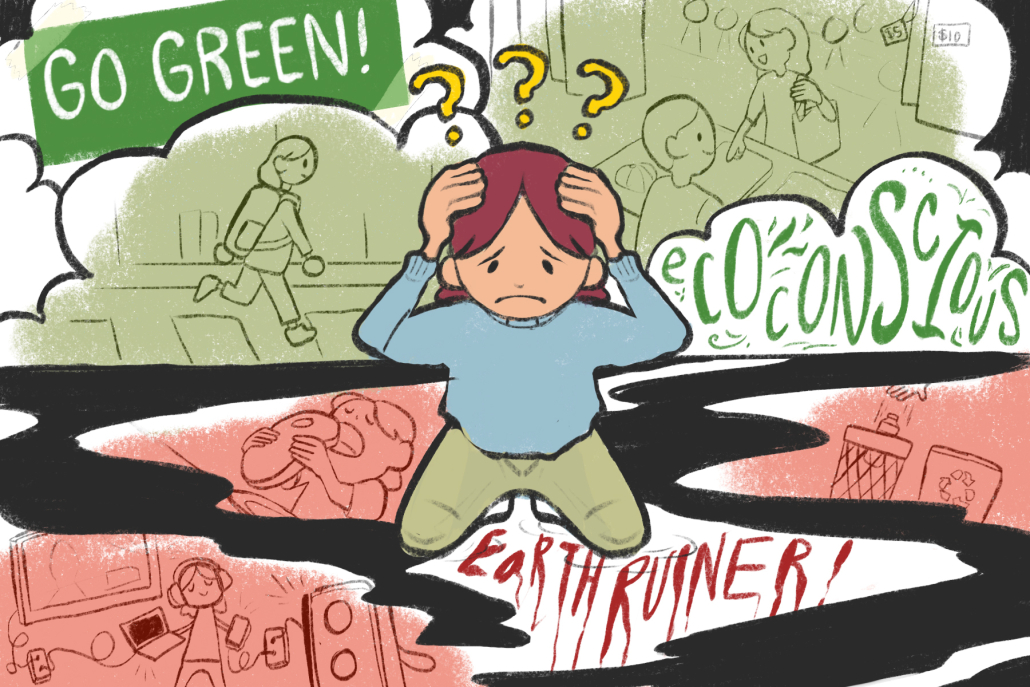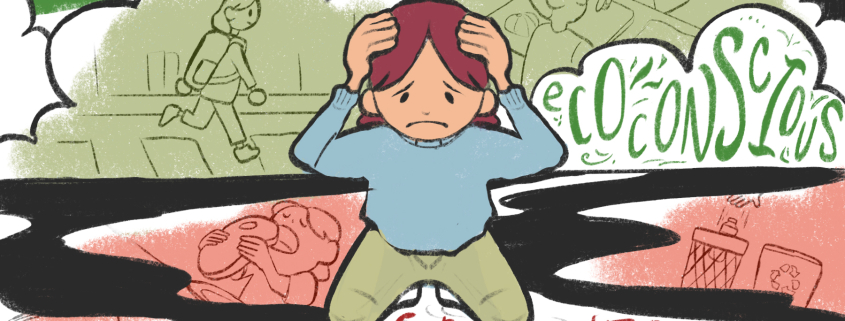Local Earth ruiner here

Well, Earth Month is in full swing.
We are almost two weeks into April and I can say wholeheartedly that my eco-consciousness has not been anymore awakened than it had been a few weeks ago: My laptop, iPhone and iPad are all charging simultaneously as I type this, nearly all the lights in my apartment are on and my heater is set to a more-than-comfortable 75 degrees — until L.A. weather actually feels like L.A. weather, I will be creating warmth myself.
In an age where speed, ease and accessibility are at the forefront of everyone’s minds — pre-ordering food online, contactless paying, tutorials for any and everything readily available on the internet — simple tasks that require conscious effort and diligence are becoming more and more challenging to complete.
I’m not saying that making small changes to save the planet is particularly grueling or challenging. Rather, I’m saying that I’m a lazy, privileged cog in the fast-paced capitalist machine, well on my way to evolving into how humanity is depicted in “Wall-E” (2008).
Interestingly, to each minimal eco-friendly choice I do make, there seems to be a caveat that indicates my inevitable contribution to the Earth’s destruction. I thrift. But, I have also participated in purchasing fast-fashion (which at USC is equivalent to admitting I personally frack daily). I walk nearly everywhere. But, I will hop in a gas-emitting vehicle the second Shryft is available (at least it’s carpooling?). I use the dishwasher (which, according to Cascade commercials, is actually a good thing). But, if tomato sauce so much as touches a plastic tupperware, I will use copious amounts of soap and water to ensure it does not stain.
It is impossible to maintain purity when it comes to eco-consciousness because much of our lives are dictated by convenience. I have a hard time believing the everyday person is immune to the privy of not-so-eco-friendly habitual actions.
Essentially, I (and many others) am completely aware of my contribution to worsening the state of the planet: It’s the little things. No, I may not be an oil tycoon or an avid deforester; I recycle, I turn off the lights when I leave my apartment and I have a designated water bottle to fill instead of buying and throwing away plastic ones. So, while I may not be a monster hellbent on destroying the Earth for the sake of my own gain, I am definitely floating somewhere on that spectrum.
I care, I am aware, but maybe not enough. Maybe the thought that the end of the planet is inevitable is too ingrained in my mind, so I believe that continuing to eat meat while I am here won’t make a difference. According to The Guardian, research indicates that the looming, catastrophic, disastrous end of Earth does not, in fact, incite people to make changes. It does quite the opposite.
The article pulls quotes from psychologist Per Espen Stoknes, who wrote that “What we know from psychological studies is that if you overuse fear-inducing imagery, what you get is fear and guilt in people, and this makes people more passive, which counteracts engagement.”
Essentially: Who cares anymore? The world is going to end anyways, might as well be comfortable and turn that AC on full blast.
However, there may still be hope. Researchers found that when the climate change epidemic was presented as a “collective responsibility,” people were more responsive to dedicate themselves to environmental issues. As humans, we like having and maintaining control with a desire to be “remembered in a positive light.” In order for changes to occur, we need the comfort of hope and possibility instead of the threat of failure from the consequences of the past.
With this, my place on this planet means much more than my immediate day-to-day actions. I knew this already, but something about the aspect of unity and collaboration makes the daunting task of maintaining the well-being of the Earth a bit easier to swallow — one that requires rationing first.
Let’s work on finishing it together.

